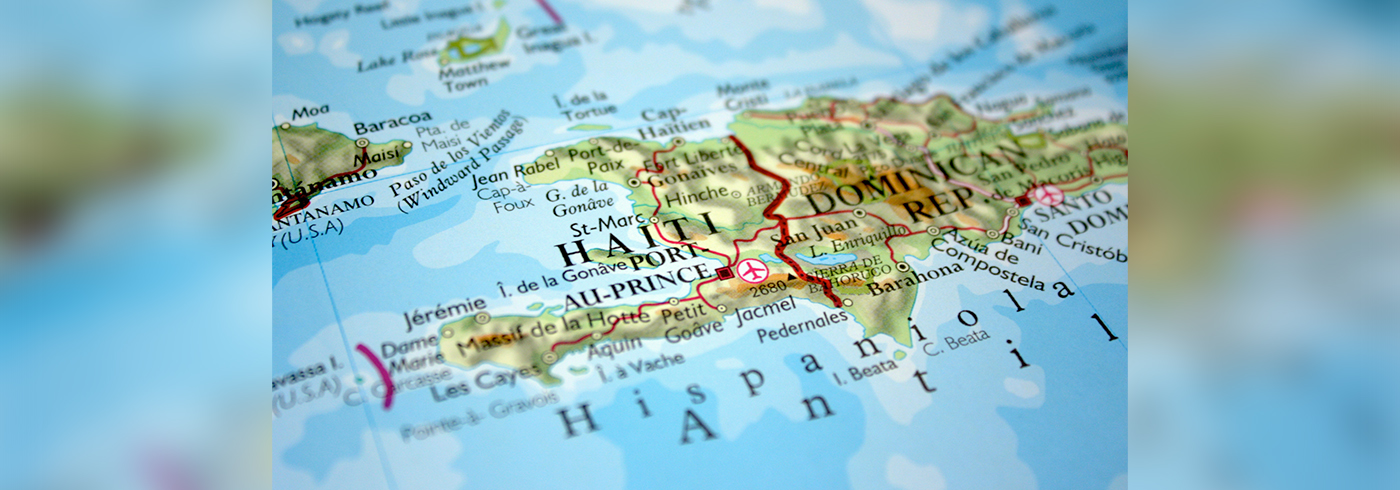Haitian Christians Resilient Amidst Suffering and Fear
 Murders and kidnappings are commonplace in Haiti, especially in its gang-controlled capital of Port au Prince, which can place Christians in the crosshairs.
Murders and kidnappings are commonplace in Haiti, especially in its gang-controlled capital of Port au Prince, which can place Christians in the crosshairs.
Imagine what it would be like if every day when you left your home, your spouse and children would have legitimate reasons to fear for your safety, that they may never see you again — that you are a likely candidate to be kidnapped or killed?
A career criminal or someone mixed up in the drug world would seem to be someone who might fit the kidnapped/killed scenario, but a minister?
Calixte Fleuridor has been the national superintendent of the Haiti Assemblies of God since 2008. Listening to him speak in fluid Haitian Creole (as former AG missionary to Haiti, James Courter, served as translator) and observing his frequent smiles, friendly demeanor, periodic laughter, and constant graciousness, one would never guess of the extreme stresses that he has walked through or the additional pressures and dangers he now faces — including being what some may consider a “high-value” target.
2010 DISASTER
Although Haiti was already one of the poorest countries in the Western Hemisphere, in 2010, a 7.0 earthquake decimated the capital and chief-port city of Port au Prince and surrounding area as thousands of inadequately built homes and structures collapsed. The UN reported more than 200,000 were killed, over 300,000 were injured, and 1.5 million were left homeless – the estimated metropolitan population in the Port au Prince region in 2010 was 2.6 million.
Fleuridor faced massive challenges as multiple AG churches were destroyed, many ministers and congregation members lost their homes, and others lost their lives. As Haiti is only roughly the size of Massachusetts, nearly everyone personally experienced or knew of a family member or friend who suffered devastating loss.
And Fleuridor, 53, and his wife, Guerda Severe, who live in Port au Prince with their four children (two born after 2010), had their own personal safety to guard and challenges to overcome while also shepherding a distraught and dispersed flock.
It could be said that due to the 2010 earthquake, Haiti regressed from being a developing nation to a desolate nation in less than a minute. The silver lining was that soon after the disaster, the country was flooded with church teams and ministries, including AG World Missions and Convoy of Hope, working to provide food, clothing, medical assistance, and shelter while also demonstrating and sharing the gospel message in cooperation with the Haiti AG.
But sadly, with the billions of dollars in aid and finances pouring into the nation, corruption accompanied it. It seems much, if not most, of the monetary aid never made it to those in need. Despite well-intentioned efforts of many, the United Nations News recently stated on its site, “The 2023 Humanitarian Needs Overview (HNO) for Haiti describes life in the country as a daily, terrifying struggle for survival . . . Every day, more and more people fall into extreme poverty; 31% of the population lives on less than US$2.15 a day, and some 4.8 million are food-insecure, which means that they struggle to meet their daily nutritional needs.”
And through this disastrous sequence of events — the loss of lives, homes, income, and now personal safety due to gang violence — Fleuridor says the Haiti AG church continues to lean into God and one another to bolster faith and hope.
CHALLENGES CONTINUE
As Haiti struggled following the 2010 earthquake to right itself, progress was slow. In 2021, things went from slow to chaos. In July, the Haitian president, Jovenel Moïse, was assassinated. In August, a 7.2 earthquake struck western Haiti killing more than 2,200 and injuring more than 12,000. Three days later, tropical storm (later hurricane) Grace hit Haiti, adding flooding to the destruction.
The former prime minister, Ariel Henry, assumed leadership of the country shortly after the assassination of Moïse. To this point, his leadership has been ineffective — just in the first two weeks of March 2023 alone, according to the UN, 208 people were killed, 164 injured, and 101 kidnapped — with most of the victims killed or injured by snipers randomly shooting at people.
With estimates as high as 90% of Port au Prince being controlled by violent gangs who rule by fear, even meeting in a church can have dire consequences.
Last fall, a police officer was executed by gang members while attending services in an AG church in Port au Prince because he had given a gang member “trouble.” More recently, Fleuridor says, a deacon was walking home after a church service and was shot and killed and a speaker at another AG church was also killed on his way home — both for no apparent reason.
“It used to be, Christianity and religion in general had a generally high place in Haitian culture, and had some respect, but that has shifted. Grace is no longer there,” Fleuridor says. “These gangs, their regard for life is really low. If they get some new guns or artillery, they might just unload their guns on people to try it out.”
Of the 237 AG churches in Haiti, 36 of them are in Port au Prince. Few of those churches meet in sanctuaries as many have been gutted and destroyed by gangs. Instead, members gather in small groups in homes.
“There has been a mass exodus from the city,” Fleuridor says, citing the gang violence. “Churches have had to close periodically, we’re losing members . . . it’s just a very desperate situation.”
And there’s sound reasoning behind Fleuridor’s wife and children being concerned for his safety and his value as a “target.” Not only is he the national superintendent of the Assemblies of God, he’s also president of the Federation of Protestant Churches and, perhaps more significantly, a member of the Leadership Transition Committee designed to help transition Henry from leadership to a democratically elected leader — with gangs’ desires for or against this transition yet unknown.
CONVOY OF HOPE
Those who are familiar with Convoy of Hope may recall that Convoy was in a unique position to provide food to survivors following the 2010 earthquake as they already had warehouses and a well-established food program for children in the country.
However, with the rise of gangs’ power and influence and the loss of control by the government, it seems Convoy’s efforts could have totally ceased. But that’s not the case.
“Convoy of Hope has been engaged in Haiti since 2007, working with school nutrition programs and churches,” says Kevin Rose, senior director of Global Programs Partner Relations. “Following the 2010 earthquake, the feeding program grew to 126,000 children daily.”
But with the ongoing terrorism of Port au Prince, Rose says Convoy had to get creative to maintain its commitment to kids in Haiti. As many families have left the city to outer regions, Convoy and its partners in Haiti have adjusted to reach the children that have flooded into new areas of the country, with Port au Prince nearly inaccessible.
However, what hurts Port au Prince hurts the rest of the country as it's the primary port and economic center for the country. Rose notes that there’s a powerful ripple effect based on what happens in the city as skyrocketing prices, blocked roads, and port disruptions significantly impact the lives of those outside of the capital as well.
Yet, as national spokesperson, Ethan Forhetz points out, the Convoy program in Haiti is now “indigenous.”
“It’s the goodness of God, preparing us in advance to be there (for 2010) and then to be able to prepare them (Haitians) for such a time as this — there are no Convoy U.S. personnel in Haiti at this time,” Forhetz states. “The Haitian people we’ve trained up are able to carry the load and carry on the ministry on their own.”
Rose notes that Convoy is far from the only ones responsible for the readiness of Haitians to take on leadership roles.
“It’s not been lost to us, that it’s the faithful ministry of the national church and people like missionaries Bill and Dorothy Smith, who touched the lives of young men and women and pastors across the island that have made such a difference — now we’re seeing the fruit of their labor,” Rose says. “There are so many bright spots of Haitians rising to the challenge — they are some of the most strong, resilient, fighting people I know and they’re continuing on, rising to the occasion to fight for the hurting and suffering in their community.”
WHAT HAITI NEEDS
Fleuridor says that many of the 67,000 AG congregants — as well as millions of other Haitians — are facing huge daily stresses due to security issues, which in turn causes economic and food issues. The challenges are so vast, divine intervention appears to be the only answer.
“The situation is almost beyond ability to express it in words,” Fleuridor says. “In all my life and in the lives of the elders I lean into, we agree that this is the worst moment Haiti has ever known.”
However, Fleuridor says that as he encounters other AG ministers and parishioners, there is one thing that stands out to him: “They have never lost their faith,” he says. “Even in the midst of the insecurity, there’s the sense that God has not and will not abandon them . . . there’s a sense of building of faith and they walk by faith.”
Fleuridor asks believers to pray for the country and for God to raise up a pure leader who would lead the country. He asks for prayer for Haitian believers that God would return them to a place of influence for Him in the country. In addition, he requests prayer for his family, spiritual wisdom in his own words and decisions, and supernatural protection in what has become an extremely hostile environment.
“I’m thankful for the grand family of the World Assemblies of God,” Fleuridor says, “for covering us as a body and praying for Haiti during this time.”
A career criminal or someone mixed up in the drug world would seem to be someone who might fit the kidnapped/killed scenario, but a minister?
Calixte Fleuridor has been the national superintendent of the Haiti Assemblies of God since 2008. Listening to him speak in fluid Haitian Creole (as former AG missionary to Haiti, James Courter, served as translator) and observing his frequent smiles, friendly demeanor, periodic laughter, and constant graciousness, one would never guess of the extreme stresses that he has walked through or the additional pressures and dangers he now faces — including being what some may consider a “high-value” target.
2010 DISASTER
Although Haiti was already one of the poorest countries in the Western Hemisphere, in 2010, a 7.0 earthquake decimated the capital and chief-port city of Port au Prince and surrounding area as thousands of inadequately built homes and structures collapsed. The UN reported more than 200,000 were killed, over 300,000 were injured, and 1.5 million were left homeless – the estimated metropolitan population in the Port au Prince region in 2010 was 2.6 million.
Fleuridor faced massive challenges as multiple AG churches were destroyed, many ministers and congregation members lost their homes, and others lost their lives. As Haiti is only roughly the size of Massachusetts, nearly everyone personally experienced or knew of a family member or friend who suffered devastating loss.
And Fleuridor, 53, and his wife, Guerda Severe, who live in Port au Prince with their four children (two born after 2010), had their own personal safety to guard and challenges to overcome while also shepherding a distraught and dispersed flock.
It could be said that due to the 2010 earthquake, Haiti regressed from being a developing nation to a desolate nation in less than a minute. The silver lining was that soon after the disaster, the country was flooded with church teams and ministries, including AG World Missions and Convoy of Hope, working to provide food, clothing, medical assistance, and shelter while also demonstrating and sharing the gospel message in cooperation with the Haiti AG.
But sadly, with the billions of dollars in aid and finances pouring into the nation, corruption accompanied it. It seems much, if not most, of the monetary aid never made it to those in need. Despite well-intentioned efforts of many, the United Nations News recently stated on its site, “The 2023 Humanitarian Needs Overview (HNO) for Haiti describes life in the country as a daily, terrifying struggle for survival . . . Every day, more and more people fall into extreme poverty; 31% of the population lives on less than US$2.15 a day, and some 4.8 million are food-insecure, which means that they struggle to meet their daily nutritional needs.”
And through this disastrous sequence of events — the loss of lives, homes, income, and now personal safety due to gang violence — Fleuridor says the Haiti AG church continues to lean into God and one another to bolster faith and hope.
CHALLENGES CONTINUE
As Haiti struggled following the 2010 earthquake to right itself, progress was slow. In 2021, things went from slow to chaos. In July, the Haitian president, Jovenel Moïse, was assassinated. In August, a 7.2 earthquake struck western Haiti killing more than 2,200 and injuring more than 12,000. Three days later, tropical storm (later hurricane) Grace hit Haiti, adding flooding to the destruction.
The former prime minister, Ariel Henry, assumed leadership of the country shortly after the assassination of Moïse. To this point, his leadership has been ineffective — just in the first two weeks of March 2023 alone, according to the UN, 208 people were killed, 164 injured, and 101 kidnapped — with most of the victims killed or injured by snipers randomly shooting at people.
With estimates as high as 90% of Port au Prince being controlled by violent gangs who rule by fear, even meeting in a church can have dire consequences.
Last fall, a police officer was executed by gang members while attending services in an AG church in Port au Prince because he had given a gang member “trouble.” More recently, Fleuridor says, a deacon was walking home after a church service and was shot and killed and a speaker at another AG church was also killed on his way home — both for no apparent reason.
“It used to be, Christianity and religion in general had a generally high place in Haitian culture, and had some respect, but that has shifted. Grace is no longer there,” Fleuridor says. “These gangs, their regard for life is really low. If they get some new guns or artillery, they might just unload their guns on people to try it out.”
Of the 237 AG churches in Haiti, 36 of them are in Port au Prince. Few of those churches meet in sanctuaries as many have been gutted and destroyed by gangs. Instead, members gather in small groups in homes.
“There has been a mass exodus from the city,” Fleuridor says, citing the gang violence. “Churches have had to close periodically, we’re losing members . . . it’s just a very desperate situation.”
And there’s sound reasoning behind Fleuridor’s wife and children being concerned for his safety and his value as a “target.” Not only is he the national superintendent of the Assemblies of God, he’s also president of the Federation of Protestant Churches and, perhaps more significantly, a member of the Leadership Transition Committee designed to help transition Henry from leadership to a democratically elected leader — with gangs’ desires for or against this transition yet unknown.
CONVOY OF HOPE
Those who are familiar with Convoy of Hope may recall that Convoy was in a unique position to provide food to survivors following the 2010 earthquake as they already had warehouses and a well-established food program for children in the country.
However, with the rise of gangs’ power and influence and the loss of control by the government, it seems Convoy’s efforts could have totally ceased. But that’s not the case.
“Convoy of Hope has been engaged in Haiti since 2007, working with school nutrition programs and churches,” says Kevin Rose, senior director of Global Programs Partner Relations. “Following the 2010 earthquake, the feeding program grew to 126,000 children daily.”
But with the ongoing terrorism of Port au Prince, Rose says Convoy had to get creative to maintain its commitment to kids in Haiti. As many families have left the city to outer regions, Convoy and its partners in Haiti have adjusted to reach the children that have flooded into new areas of the country, with Port au Prince nearly inaccessible.
However, what hurts Port au Prince hurts the rest of the country as it's the primary port and economic center for the country. Rose notes that there’s a powerful ripple effect based on what happens in the city as skyrocketing prices, blocked roads, and port disruptions significantly impact the lives of those outside of the capital as well.
Yet, as national spokesperson, Ethan Forhetz points out, the Convoy program in Haiti is now “indigenous.”
“It’s the goodness of God, preparing us in advance to be there (for 2010) and then to be able to prepare them (Haitians) for such a time as this — there are no Convoy U.S. personnel in Haiti at this time,” Forhetz states. “The Haitian people we’ve trained up are able to carry the load and carry on the ministry on their own.”
Rose notes that Convoy is far from the only ones responsible for the readiness of Haitians to take on leadership roles.
“It’s not been lost to us, that it’s the faithful ministry of the national church and people like missionaries Bill and Dorothy Smith, who touched the lives of young men and women and pastors across the island that have made such a difference — now we’re seeing the fruit of their labor,” Rose says. “There are so many bright spots of Haitians rising to the challenge — they are some of the most strong, resilient, fighting people I know and they’re continuing on, rising to the occasion to fight for the hurting and suffering in their community.”
WHAT HAITI NEEDS
Fleuridor says that many of the 67,000 AG congregants — as well as millions of other Haitians — are facing huge daily stresses due to security issues, which in turn causes economic and food issues. The challenges are so vast, divine intervention appears to be the only answer.
“The situation is almost beyond ability to express it in words,” Fleuridor says. “In all my life and in the lives of the elders I lean into, we agree that this is the worst moment Haiti has ever known.”
However, Fleuridor says that as he encounters other AG ministers and parishioners, there is one thing that stands out to him: “They have never lost their faith,” he says. “Even in the midst of the insecurity, there’s the sense that God has not and will not abandon them . . . there’s a sense of building of faith and they walk by faith.”
Fleuridor asks believers to pray for the country and for God to raise up a pure leader who would lead the country. He asks for prayer for Haitian believers that God would return them to a place of influence for Him in the country. In addition, he requests prayer for his family, spiritual wisdom in his own words and decisions, and supernatural protection in what has become an extremely hostile environment.
“I’m thankful for the grand family of the World Assemblies of God,” Fleuridor says, “for covering us as a body and praying for Haiti during this time.”



